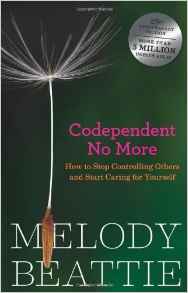 Pieces & Bits
Pieces & Bits
Drama Addicts are people who have become addicted to problems and turmoil; problems have become a comfortable emotional experience
Drama Addicts:
- get involved with problems that are not their own
- think a peaceful life is boring
- create problems
As we develop our lives, set goals and find things to do, peace will be comfortable.
Expectations
Expectations are our ideas about how we want things to turn out or how we want people to behave.
Thoughts about Expectations:
- It is a waste of time to expect healthy behavior from unhealthy people.
- We do have a right to expect good things and appropriate behavior.
- If we let go of all expectations we can be free to live moment to moment.
- Talking about our expectations with trusted people can help us define whether our expectations are realistic.
Fear of Intimacy
Fear of Intimacy is a fear of being hurt by love.
- Fear is equally as strong as love
- Some people feel it is safer to be alone than to love
- Love is uncertain and opens us to be vulnerable in closeness
- Love can be related to pain for some people
- Love requires emotional honesty
- Love brings joy and warmth, but also requires us to be willing to feel hurt and rejection occasionally
- Some people avoid love, run from it or reject love before they can be rejected
- For some families care taking and substance use has become a substitute for intimacy
- It is ok to give and receive love
Financial Responsibility
- Some codependents become financially dependent on other people
- Some codependents become financially responsible other people
- It is important to decide the responsibilities for each person and meet them
- Earning money, paying bills, and feeling financially responsible is part of taking care of ourselves
- Being financially dependent can lead to emotional dependency
Forgiveness
- Compulsive disorders distort forgiveness
- Some people cannot forgive because it might make us vulnerable to being hurt again and we don’t think we can handle more pain
- Some people think they have or they are trying to forgive but the hurt and anger wont disappear
- Sometimes there are so many things going on we can’t keep up—we can’t forgive before something else happens
- Forgiving someone doesn’t mean we let people keep hurting us
- We need to think about, remember, understand and make good decisions about what we are forgiving
- Grudges and anger hurt us
- We need to be gentle, loving and forgiving of ourselves before we can expect to forgive others
Fun
- It is hard to have fun when we hate ourselves
- It is hard to have fun when we are full of repressed feelings, worried, full of guilt and sadness, rigidly controlling ourselves or others or what they think about us
- We need to play and enjoy our lives
- Suffering can be habitual so we must overcome and celebrate life
Limits/Boundaries
Boundaries are limits that say:
- This is how far I shall go
- This is what I will or wont do for you
- This is what I wont tolerate from you
Compulsive disorders mock limits—push them all over until even the most human behaviors become intolerable.
We may become so accustomed to verbal abuse or disrespectful treatment that we do not notices when it is happening or we think it is what we deserve.
Codependents need boundaries
Common recovering codependent boundaries:
- I will not allow anyone to physically or verbally abuse me
- I will not knowingly believe or support lies
- I will not allow substance abuse in my home
- I will not allow criminal behavior in my home
- I will not rescue people from the consequences of substance abuse or other irresponsible behavior
- I will not finance a person’s substance abuse or other irresponsible behavior
- I will not lie to protect you from your compulsive behavior
- I will not use my home as a detox center for recovering substance addicts
- If you want to act crazy that’s your business, but you can’t do it in front of me. Either you will leave or I will walk away
- You can spoil your fun, your day or your life, that’s your business—but I wont let you spoil my fun, my day or my life.
Sometimes it is necessary to create certain boundaries that apply to a particular relationship.
Don’t feel guilty and don’t backdown from your boundaries.
You will probably be tested for your boundaries several times—people want to see if we are serious—especially if we have not be forthright or have been swayed in the past.
Physical Care
- In the latter stages of codependency we may neglect our health and grooming
- Look in the mirror, if we don’t like what we see, we need to fix it
- Don’t stop exercising
- Go to the doctor when we are sick
- Get a haircut or manicure or pedicure
- Take care of emotional needs
Professional Help
We need to seek professional help if:
- We are depressed and suicidal
- We want to do an intervention and confront a troubled person or addict
- We have been the victim of physical or sexual abuse
- We have been abusing someone else physically or sexually
- We are having problems with substance abuse
- We can’t seem to solve our own problems or get “unstuck” on our own
- For any reason we think we need professional help
When working with a professional we must listen to our feelings and trust ourselves. If we don’t feel right, we need to find a new professional. Maybe this professional doesn’t know how to work with people living with compulsive disorders.
Strokes: Good Comments, Support, Care
- Find people we can have honesty, tenderness, love and appreciation with
- The goal is good relationships
- We also want good physical and emotional treatment
- Hugs cause endorphins to pop
- We need to learn to accept compliments unless we sense they are coming from someone with bad motives
- Give compliments
- Learn when we need strokes
- Codependents tend to have friends who are victims—these friends give sympathy, not strokes
- Real friends will listen and care but they will trust you to figure out your own problems.
Trust
- Codependents often aren’t suer who they can trust
- Quit trying to trust people you don’t trusted
- We can trust ourselves
- We can only trust people to be who they are
- We must learn to see people for who they are
- If we pay attention to ourselves and the messages we receive from the world, we will know who we can trust
 Sex
Sex
- The sexual relationship will echo and reflect the overall tone of the relationship.
- Caretakers will be caretakers in the bedroom.
- Anger and hurt outside the bedroom will also be in the bedroom.
- Sex can become a clinical act or nonexistent.
- Sex can be humiliating.
Stop hating and blaming ourselves. When we start loving ourselves we will begin to heal.
Be honest with partner, talk about thoughts, feelings or desires. Explore possibilities.
Infidelities may need to be forgiven. We may need to look to a counselor or clergy person for help with this.
Sex does not equal love.
Sex can only express the love that already exists.
Feel free to leave your comments below!
My name is Summer. That is how you can call me. I hope that I am a blessing to you. I am not perfect. I will fall again. But I am forgiven.
Do you know Jesus? Do want the Holy Spirit to fill you and give you understanding and salvation? Ask Him. Want someone to pray with you? Contact me.
If you would like to know Jesus as your friend, but want to make this amazing commitment by yourself please pray something like this:
Thank you Jesus that You are the Son of God, the God that created heaven and earth. Thank you Jesus that You came to earth in the form of a man so that You would be able to empathize with my humanity. Thank You that You did this in order to fulfill the promises You made at the foundation of the world.
I realize that I am a sinner and do things that hurt myself and keep myself away from you. Thank You that You died for my sins so that You could defeat death and bring me into Your life. Please forgive me.
I ask You to be Lord of my life. I ask you to heal my hurts and show me what my new life, empowered by You looks like. Thank You for Your mercy.
Amen
The Lord is with you always.



 Please wait...
Please wait...

